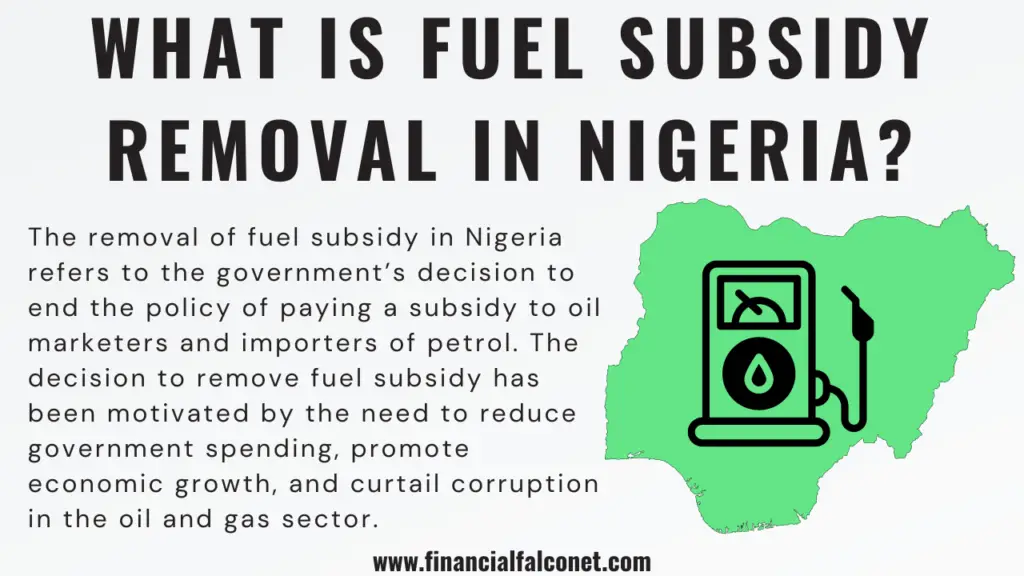Fuel subsidy removal in Nigeria has been a contentious issue for decades with various governments attempting to reduce or eliminate it. The subsidy, intended to lower the fuel cost for citizens, has been a significant drain on the Nigerian economy, with the government spending billions of dollars annually to subsidize fuel imports. However, the removal of the subsidy is also highly controversial, with many Nigerians fearing that it will lead to an increase in the cost of living and further hardship for the poor. In this article, we shall discuss some important facts and answer pressing questions about fuel subsidy removal in Nigeria.
See also: Why is there fuel subsidy in Nigeria?
Has fuel subsidy been removed?
Fuel subsidy has not yet been removed in Nigeria. The government had earlier proposed that fuel subsidy will end by June 2023 as the country’s subsidy budget for the year stopped that month. Based on these, the price of petrol is supposed to be determined by market forces starting in July 2023. However, recent reports have revealed that although fuel subsidy will be eventually removed in Nigeria, it would not be at the earlier proposed date of July 2023. Hence, there is still a fuel subsidy in Nigeria until further notice.

Does subsidy removal hurt the poor?
Yes, fuel subsidy removal in Nigeria can hurt poor citizens particularly those who rely on fuel for their livelihoods due to the negative impacts that may arise. The immediate effect of subsidy removal is an increase in fuel prices, which can have a ripple effect on the prices of goods and services, leading to higher inflation. This can make it harder for the poor to afford basic necessities such as food, transportation, and healthcare. The poor in Nigeria mainly rely on public transportation for mobility. An increase in fuel prices resulting from subsidy removal can lead to a rise in transportation costs, which can be particularly burdensome for low-income earners.
This can also lead to an increase in the cost of goods and services as transportation costs are often passed on to consumers. Additionally, the removal of fuel subsidy could result in job losses, as some businesses may struggle to absorb the increased costs of transportation and production. This could further exacerbate the poverty situation in the country.
Despite this immediate negative impact on the poor, it is important to note, that fuel subsidy removal is a necessary step towards improving the economy in the long term, as it can help to reduce government expenditure and improve efficiency. Nevertheless, any decision to remove fuel subsidy in Nigeria should be carefully considered, and steps should be taken to mitigate its impact on the poor, such as implementing targeted social welfare programs and investing in more public transportation options so as to reduce transportation costs.
See also: Effects of fuel subsidy in Nigeria
Understanding fuel subsidy removal in Nigeria
Fuel subsidy removal in Nigeria is a complicated issue that has been a subject of debate and controversy for many years. The Nigerian government has historically subsidized the price of petroleum products, particularly petrol, to cushion the effect of rising prices on its citizens.
This means that the government covers the difference between the selling price of petrol in Nigeria and the expected open market price (EOMP). For instance, if the EOMP of 1 litre of petrol is N200 and its pump price in Nigeria is N50, it means the government pays the N150 difference to ensure that Nigerians buy a litre of fuel at N50.
However, in recent years, there has been a growing call for the removal of fuel subsidies due to their high cost and the inefficiencies in the subsidy system. Fuel subsidy removal means that the government would no longer subsidize the price of premium motor spirit (petrol), instead, the price would be determined by market forces. This includes factors such as freight costs, distributor margins, as well as the cost of importation. Due to these, there would consequently be an increase in the price of fuel, which could have significant implications for the Nigerian economy and its citizens as petrol prices will no longer be controlled nor subsidized by the government once fuel subsidy is removed in Nigeria.
The Nigerian government has made several attempts to remove fuel subsidies in the past, but these attempts have been met with protests and opposition from the public.
These fuel subsidy removal attempts have been in 1978, 1993, 2003, 2012, 2016, 2020, and recently, 2023. So far, success has been recorded with the removal of the subsidy on diesel in 2004 and that of kerosene in 2016 but the subsidy on petrol still lingers. The government has often cited the need to remove fuel subsidies to address the country’s fiscal challenges, but the public has argued that the removal of fuel subsidies would lead to an increase in the cost of living and hurt the poor.
Proponents of fuel subsidy removal argue that it would save the government a significant amount of money that could be redirected towards other sectors, such as healthcare, education, and infrastructure development. They argue that fuel subsidies have become a burden on the Nigerian economy, as they account for a significant proportion of government spending and create opportunities for corruption and rent-seeking.
Opponents of fuel subsidy removal argue that it would have a negative impact on the Nigerian economy and its citizens, particularly the poor. They argue that the removal of fuel subsidies would lead to an increase in the price of goods and services, as transportation costs would increase. This, in turn, would lead to an increase in the cost of living, which would disproportionately affect the poor and low-income earners. They further argue that the removal of fuel subsidies would lead to an increase in the cost of production, which would make Nigerian goods less competitive in the global market. This could result in a decline in exports and a negative impact on the economy.
See also: What is Excess Crude Account (ECA)?
How much will fuel cost if subsidy is removed?
The exact cost of fuel, if subsidy is removed, is difficult to predict since the country relies heavily on imported fuel to meet domestic demands. The cost of fuel in Nigeria if the fuel subsidy is removed would depend on several factors including policy decisions and various market factors such as the global price of oil, the exchange rate of naira to dollar, the rate of demand, and the level of competition in the downstream oil sector. However, it is estimated that the removal of fuel subsidies in Nigeria would lead to an increase in the price of fuel by at least 50 -70%. In February 2023, there were reports that petrol may be sold at N315 per litre if the subsidy is removed.
What are the effects of fuel subsidy removal in Nigeria?
The removal of fuel subsidy in Nigeria would have several effects on the economy and its citizens. Some of these effects include a reduction in government expenditure and corruption, an increase in fuel prices, inflation, social unrest, and a negative impact on the poor. Fuel subsidy removal has historically been a contentious issue in Nigeria, and any attempt to remove it could lead to protests and social unrest, as citizens may view it as an attempt by the government to further burden the poor.
One of the most significant effects of fuel subsidy removal would be an immediate increase in fuel prices. This would lead to an increase in the cost of transportation and the cost of living, which could be especially challenging for low-income earners.
The increase in fuel prices would also lead to an increase in the cost of production and transportation, which could lead to an increase in the prices of goods and services. This would result in higher inflation, which could further erode the purchasing power of citizens.
On the positive side, fuel subsidy removal would lead to a reduction in government expenditure on fuel subsidies, which could free up resources for investment in other sectors such as healthcare, education, and infrastructure. It would also reduce the opportunities for corruption and rent-seeking that exist in the subsidy system. This could lead to more efficient use of resources and improved governance.
Ultimately, fuel subsidy removal in Nigeria would have both positive and negative effects on the economy and its citizens. While it could reduce government expenditure and corruption, it could also lead to an increase in fuel prices, inflation, and social unrest, particularly among the poor and low-income earners. Thus, any decision to remove fuel subsidies must be carefully considered and should take into account the interests of all stakeholders.
See also: Developing Countries Characteristics
Conclusion
Fuel subsidy removal in Nigeria is a complex issue that requires careful consideration of its potential impact on the Nigerian economy and its citizens. While proponents argue that it would save the government a significant amount of money and reduce opportunities for corruption, opponents argue that it would lead to an increase in the cost of living and hurt the poor.
Ultimately, any decision on fuel subsidy removal in Nigeria should take into account the interests of all stakeholders, particularly the poor and low-income earners. The government can also mitigate the negative effects by making the refineries functional, making alternative public transportation systems available, and stabilizing the power supply.
Last Updated on November 2, 2023 by Nansel Nanzip BongdapBlessing's experience lies in business, finance, literature, and marketing. She enjoys writing or editing in these fields, reflecting her experiences and expertise in all the content that she writes.
